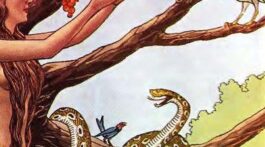Sabbath School Lesson for January 17-23, 2015
In the first seven chapters of Solomon’s book of wise proverbs, he has tried to personify wisdom, or the fear and knowledge of the Lord, by identifying it as a holy and true woman, to be desired and searched for (“If you seek her as silver, And search for her as for hidden treasures;” Proverbs 2:4 NKJV).
But in Proverbs 8, we notice the language gently shifting and wisdom is described in terms that could only apply to Christ, especially before His incarnation (His becoming flesh).
We are comfortable with the concept of God being Love. I John 4:8 states clearly that “God is love.” It is an attribute of God that defines His whole character. What Solomon is trying to convey is that Christ, this Messiah who was with the Father and helped Him create our planet and then implement the plan to save it by His atoning sacrifice, is wise to the extent that God is also this Wisdom that Solomon is recommending that we search for and make our own.
As John convinces us that the only way to have true love is through God, because God IS love, Solomon convinces us that the only way to have true wisdom is through God, because God IS wisdom. Surely, our God is big enough to be both, and so much more.
Key Text: “The Lord possessed me at the beginning of His way, before His works of old” Proverbs 8:22 NKJV
Other translations have rendered the word “possessed” as “created’ or “formed” me in the beginning. So Solomon takes us back to the creative powers of God to identify Him as the source of wisdom. We will see through our study this week that God is truly a warm, personal, as well as wise Being, and we will be attracted to Him all the more.
Sunday: Wisdom Cries Out
After reading Proverbs 8:1-21, we see the value of wisdom. As all the gold, silver, and precious metals of the world call out to us to find them, God is also very vocal in trying to get our attention.
With words like “cry out”, “lift up her voice”, “call”, “speak”, “lips”, “mouth”, and “words”, we see metaphors that are clearly pointing to the idea that wisdom is something to be communicated and heard.
Repeatedly, these words spoken of by God are said to be true and righteous, not crooked and perverse. Truth is very important to this God. It’s the foundation of His character. John 1:9 says, “That was the TRUE Light which gives light to every man coming into the world.” NKJV
The first words spoken by God on Creation week were “Let there be light.” Dividing the light from the dark was a very symbolic act. God’s purpose in creating us and our world was to manifest His truth to the universe. Satan’s accusation and their end result must be exposed.
Deuteronomy 32:4 is a good summation of this passage in Proverbs. Moses wrote:
“He is the Rock, His work is perfect; For all His ways are justice, A God of truth and without injustice; righteous and upright is He.” NKJV
Discussion Questions: Compare Proverbs 8:10, 11 with Ecclesiastes 2:11-13. What is King Solomon, one of the richest rulers on earth, trying to tell us about the value of wisdom?
Read Matthew 16:26 and discuss how Jesus outlined our first priority in life. Could this be the same message Solomon is trying to convey to us? What makes our “souls” so valuable?
Monday: Wisdom and Creation
The next passage in Proverbs, chapter 8 verses 22-31, speaks loudly of the Creation of this world and even the universe. We are taken all the way back to “the beginning of His way” (v. 22).
If God uses wisdom to create everything, then wisdom is the oldest tool, older than the universe itself. Verse 23 says it was “established from everlasting.” This emphasizes to us all the more its precious value. No wonder it is so closely identified with God’s character and description.
We can clearly see by this definition of wisdom that it isn’t something we can generate for ourselves. It is indeed a God-given attribute. To walk in our own light is to be in darkness. Only God can light our way and lead us to our everlasting home with Him in glory.
Discussion Questions: Why is belief in the Creation story, as given in Genesis, important to our understanding of biblical wisdom? How is God’s power diminished by believing it may have taken untold years, instead of one week, to create our planet? If He spoke it into existence, as indicated by Moses and other Bible writers, why would He need years to make it happen?
In what ways is evolution not a satisfactory version of our origin and purpose in life?
Tuesday: Rejoicing in Creation
 Continuing our look at Proverbs 8:22-31, we notice all three elements of creation mentioned: heaven, water, and the earth. But the final statement, verses 30-31, reflects the Genesis story as well.
Continuing our look at Proverbs 8:22-31, we notice all three elements of creation mentioned: heaven, water, and the earth. But the final statement, verses 30-31, reflects the Genesis story as well.
“Then I was beside Him as a master craftsman; And I was daily His delight, Rejoicing in His inhabited world, And my delight was with the sons of men.” Proverbs 8:30-31 NKJV
We can’t help but see the rejoicing nature of the Genesis account reflected here (Man was “daily His delight” He was thinking of man after each creation day).
After each day of creation, God said, “It was good.” And on the final day, after all was accomplished, He said, “It was VERY good.” It was time to throw a really big party then! And the Sabbath was the day designated to celebrate it from then on. On this day especially, God has delight in our close, joyful fellowship.
We see evidence from these verses that God is interested in:
- enjoyment, and
- relationship with His created beings
Do these portrayals of the Creator God include Jesus? How does Christ fit in this story of creation? These verses might help us to see His involvement:
- “He is the image of the invisible God, [don’t forget we were made in HIS image, so that would be Christ’s] the firstborn over all creation. for by Him all things were created that are in heaven and that are in earth, visible and invisible, whether thrones or dominions or principalities or powers. All things were created through Him and for Him. [If all things were created through Christ, then He must be a member of the Godhead, and not a created being Himself.] And He is before all things, and in Him all things consist.” Colossians 1:15-17 NKJV
- “In the beginning was the Word, and the Word was with God, and the Word was God. He was in the beginning with God. All things were made through Him, and without Him nothing was made that was made. In Him was life, and the life was the light of men.” John 1:1-4 NKJV …”And the Word became flesh and dwelt among us…” John 1:14 NKJV
- “…These things says the Amen, the Faithful and True Witness, the Beginning of the creation of God:” Revelation 3:14 NKJV
Discussion Questions: Read I Corinthians 1:24, 30 and also Colossians 2:3 and discuss how wisdom relates to Christ’s creative powers. Why was wisdom needed to create our universe?
Read Genesis 1:2 and discuss the possible role of the Holy Spirit in the creation of the world. Why would you expect to see all three members of the Godhead involved in this event? When else in the Bible are all three mentioned working together? Why are all three called upon in the baptism service?
Wednesday: Wisdom’s Appeal
Finishing chapter 8, Solomon returns to the appeal of a father. He uses the word “blessed”:
- “blessed are those who keep my ways.” v. 32 (describes an action)
- “Blessed is the man who listens to me,” v. 34 (describes an attitude)
Jesus said similar words in Luke 11:28. “…blessed are those who hear the word of God and keep it!” NKJV So both hearing and doing are necessary.
The word “blessed” also means “happy” in both the Greek and Hebrew. So God is not only interested in our life, He’s interested in our happiness.
Finding God is the same as finding this happy life. “For whoever finds me finds life, and obtains favor from the Lord;” Proverbs 8:35 NKJV
Making this a life-and-death message, Solomon concludes with the statement: “But he who sins against me wrongs his own soul; All those who hate me love death.” Proverbs 8:36 NKJV
Discussion Questions: Many people search for happiness in life. Why do so many people never seem to attain it? Are they not looking in the right place, or are they not even looking for the right thing?
Read John 6:33. Explain what His kingdom and righteousness mean to you.
Thursday: Either/Or
Proverbs 9 is a presentation of two lifestyles. One is called Wisdom and the other Folly. Wisdom is described in vss. 1-6 and we find Folly in vss. 13-18.
Let’s take a look at how they compare:
- Wisdom is a busy person. There are seven verbs to tell of her accomplishments (built her house, hewn out seven pillars, slaughtered meat, mixed wine, furnished the table, sent out maidens, cries out in the city). These may allude to the seven days of Creation and perhaps to the building of the temple.
- Folly sits at the door of her house and does nothing.
- They both call out for the same guests (vss. 4 and 16 are exactly the same). But Wisdom invites her guests to eat bread and drink that she has prepared.
- Folly brags about the bread and water that she has stolen.
- Wisdom admonishes us to forsake our foolishness.
- Foolishness demands nothing from her audience.
Right in the middle of the chapter, vss. 4-9, we are shown who will listen to Wisdom’s advice and who will not. According to Solomon:
- Wisdom will listen, be wiser, and love the messenger.
- Folly will bear the consequences of ignorance all alone.
Discussion Questions: Read Matthew 18:3 and discuss why Jesus taught that we must learn as little children. What character traits do we see in children that help us receive wisdom?
How has your image of God changed by our study this week?
Summary
“Wisdom, in Proverbs 8, goes beyond mere poetic personification and actually refers to a divine Being–the preincarnate Christ, who was Co-creator with the Father and served as Mediator between the infinite Godhead and finite creatures even before sin.” ~the teacher’s quarterly, p. 49
Proverbs 9 urges us to make a choice between two opposing lifestyles. One is designated Wisdom and the other Folly. The descriptions given are designed to illustrate the necessity of making right choices in our lives. It takes humility to accept Wisdom and follow her ways.
Challenge
Consider Creation week and how the members of the Godhead must have enjoyed making this earth for its inhabitants. What animals and plants do you think gave them particular joy and pleasure?
Remember that the Sabbath was created for the purpose of rejoicing in God’s Creation. Resolve to make each and every Sabbath a commemoration of that event by enjoying nature in some way, as a way to fellowship with God in the way He prescribed.
Next week: The Blessings of the Righteous
To read the lesson quarterly or find other resources for study, see www.ssnet.org










